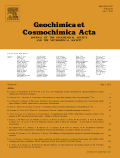
GEOCHIMICA ET COSMOCHIMICA ACTA
Scope & Guideline
Pioneering Research at the Intersection of Earth and Cosmos
Introduction
Aims and Scopes
- Geochemical Processes and Cycles:
The journal emphasizes the study of various geochemical processes, including the cycling of elements, isotopic fractionation, and the interactions between minerals and fluids in diverse geological settings. - Planetary Geochemistry:
Research on the geochemical composition and processes of planetary bodies, including the Moon, Mars, and asteroids, is a core focus, contributing to our understanding of the solar system's evolution. - Environmental Geochemistry:
Contributions that explore the impact of anthropogenic activities on geochemical processes, such as pollution and climate change, are also significant, reflecting the journal's commitment to addressing contemporary environmental issues. - Experimental and Theoretical Studies:
The journal publishes both experimental and theoretical studies that provide insights into geochemical reactions, mineral stability, and the thermodynamic properties of geological materials. - Isotope Geochemistry:
There is a strong emphasis on isotopic studies, which are used to trace processes such as fluid movement, biogeochemical cycling, and the origins of geological materials.
Trending and Emerging
- Biogeochemistry and Microbial Processes:
There is a growing interest in the interplay between geochemistry and biology, particularly how microbial processes influence geochemical cycles and the formation of minerals, reflecting a broader trend towards integrating biological and geochemical research. - Climate Change and Environmental Impact Studies:
Research addressing the impacts of climate change on geochemical processes, including the cycling of trace elements and nutrients in aquatic and terrestrial systems, has seen a marked increase, driven by the urgent need to understand anthropogenic effects on the environment. - Advanced Isotope Techniques:
Innovations in analytical techniques for isotopic studies, such as clumped isotope thermometry and high-precision mass spectrometry, are on the rise, reflecting advancements in technology that allow for more detailed and nuanced investigations of geochemical processes. - Planetary Exploration and Sample Return Missions:
Research related to planetary exploration, particularly studies emerging from sample return missions (e.g., Mars, asteroids), is increasingly prominent, as these studies provide valuable insights into the composition and history of other celestial bodies. - Interactions between Water and Rocks:
Emerging studies focusing on the interactions between aqueous fluids and geological materials, particularly in the context of mineral dissolution and alteration processes, are gaining traction, highlighting their significance in understanding both terrestrial and extraterrestrial geochemical processes.
Declining or Waning
- Traditional Mineralogy:
While mineralogy remains relevant, the focus on purely descriptive studies of mineral properties and occurrences has diminished as the field moves towards integrating mineral studies with geochemical processes and environmental impacts. - Geochemical Analyses with Limited Contextualization:
Papers that present geochemical analyses without sufficient contextualization within broader geological or environmental frameworks are becoming less frequent, as the journal increasingly values studies that link geochemistry to larger geological narratives. - Static Geochemical Models:
The use of static models to describe geochemical processes is declining, as researchers favor dynamic models that account for temporal changes and the complexity of geological systems. - Local Studies with Limited Global Significance:
Research that focuses solely on localized geological phenomena without implications for broader geochemical cycles or planetary processes is less frequently published, reflecting a trend towards studies with wider applicability.
Similar Journals

Canadian Journal of Mineralogy and Petrology
Unlocking Earth's Treasures: Peer-Reviewed Insights from Canada’s HeartThe Canadian Journal of Mineralogy and Petrology, published by the Mineralogical Association of Canada, is a pioneering platform dedicated to the dissemination of high-quality research in the realms of mineralogy, petrology, and geochemistry. With an increasing focus on global geological challenges, the journal serves as a crucial resource for researchers, professionals, and students alike, offering peer-reviewed articles that reflect the latest advancements in these fields. Although specific metrics such as the impact factor and H-Index are not currently available, the journal is committed to fostering valuable discourse and innovation, thereby enhancing our understanding of Earth's materials. The journal operates under an Open Access model, ensuring that its findings are widely accessible, thus promoting collaborative research and education. Situated in Quebec, Canada, the journal plays a vital role in connecting the international research community with local expertise and discoveries, making it an essential read for anyone involved in mineralogical sciences.
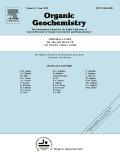
ORGANIC GEOCHEMISTRY
Unveiling the Secrets of Organic CompoundsORGANIC GEOCHEMISTRY, published by PERGAMON-ELSEVIER SCIENCE LTD, is a pivotal journal in the field of geochemistry and petrology, dedicated to the exploration of organic compounds and their interactions within geological systems. Established in 1977, this journal has been an influential medium for researchers, providing significant insights and advancements that have shaped the understanding of organic geochemistry. With an impressive impact factor and a distinguished ranking of Q2 in its category, it sits at the forefront of academic research, currently holding the 46th position out of 154 in Earth and Planetary Sciences according to Scopus, which places it within the top 70th percentile. Although it operates on a subscription basis, ORGANIC GEOCHEMISTRY is recognized for its rigorous peer-review process, ensuring that only the highest quality research is published. Its scope includes an array of critical topics, appealing to geochemists, petrologists, students, and professionals looking to deepen their knowledge and contribute to this dynamic field. With converged publications extending into 2024, the journal continues to play a crucial role in the dissemination of cutting-edge research that addresses global challenges such as environmental change and resource management.
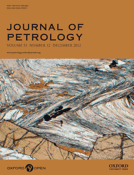
JOURNAL OF PETROLOGY
Exploring the Depths of Geochemistry and PetrologyJOURNAL OF PETROLOGY is a prestigious academic journal published by Oxford University Press, dedicated to the fields of geochemistry, petrology, and geophysics. Established in 1960, it has garnered significant recognition within the scientific community, currently holding an impressive Q1 ranking in both Geochemistry and Petrology as well as Geophysics, as of 2023. The journal is indexed in Scopus, ranking 20th out of 165 in Geophysics and 31st out of 154 in Geochemistry and Petrology, reflecting its high impact and contribution to Earth and Planetary Sciences. Designed for researchers, professionals, and students, the journal publishes cutting-edge research and reviews that advance our understanding of igneous and metamorphic processes, mineralogy, and the Earth's structure. With a commitment to rigor and scientific excellence, JOURNAL OF PETROLOGY serves as a vital resource for developing new concepts and methodologies in the study of Earth’s materials and processes.
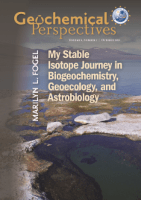
Geochemical Perspectives
Connecting Research and Application in Geochemistry.Geochemical Perspectives, published by the European Association of Geochemistry, is a pivotal journal that caters to the dynamic field of geochemistry and its related disciplines. With an ISSN of 2223-7755 and an E-ISSN of 2224-2759, this journal serves as a vital platform for disseminating cutting-edge research and developments from 2012 to the present, and into 2024. Notably, the journal has established itself with impressive rankings, including Q2 in both Geochemistry and Petrology and Geology, and a Q3 standing in Environmental Chemistry for 2023, highlighting its significant contribution to these critical scientific areas. The journal's accessibility, although not open access, ensures that valuable insights and findings are shared within the academic community. Researchers, professionals, and students eager to explore innovative perspectives and applications in geochemistry will find this journal an essential resource in their pursuit of knowledge and advancement in the field.
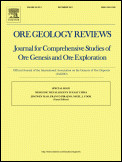
ORE GEOLOGY REVIEWS
Fostering Innovation in Earth and Planetary SciencesORE GEOLOGY REVIEWS is a premier academic journal published by Elsevier, renowned for its influential contributions to the fields of Economic Geology, Geochemistry, and Petrology, and Geology. With its esteemed Q1 ranking across these disciplines in 2023, it occupies a leading position in shaping scholarly discussions and advancements within the geological sciences. With an impressive Scopus ranking—47th in Earth and Planetary Sciences for Geology, and among the top 40 in Geochemistry and Petrology—this journal serves as an essential resource for researchers, professionals, and students committed to advancing knowledge in ore geology. Having transitioned to an Open Access model in 2022, ORE GEOLOGY REVIEWS enhances the accessibility of high-quality research, promoting wider dissemination and engagement with cutting-edge findings from 1986 to 2024. As a valued publication addressing the intricacies of ore deposits and geochemical processes, it aims to foster interdisciplinary collaboration and innovation in the field.
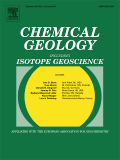
CHEMICAL GEOLOGY
Transforming Geological Knowledge into Actionable InsightsChemical Geology is an esteemed international journal published by Elsevier, dedicated to the rigorous exploration of geochemistry and petrology, with its foundational roots tracing back to 1966. As evidenced by its impressive Q1 ranking in both Geochemistry and Petrology as well as Geology in the 2023 category quartiles, this journal stands as a premier outlet for cutting-edge research and innovative methodologies within these vital fields. With a Scopus rank placing it in the top 10% of Earth and Planetary Sciences, Chemical Geology offers a platform for researchers, professionals, and students alike to disseminate findings that advance our understanding of geological processes and materials. Although it does not currently offer open-access options, the journal remains committed to high-quality publications that contribute significantly to the scholarly community. Located in the vibrant academic milieu of Amsterdam, Netherlands, Chemical Geology is an essential resource for those engaged in the earth sciences, aiming to bridge theoretical insights with practical applications.
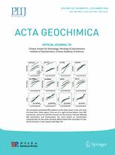
Acta Geochimica
Unveiling the Mysteries of Earth and Beyond.Acta Geochimica is a prominent academic journal published by SPRINGER INT PUBL AG, focusing on the dynamic fields of Geochemistry and Petrology. Established in 2016, this peer-reviewed publication has quickly gained recognition within the scientific community, currently holding a category quartile ranking of Q3 in Geochemistry and Petrology as of 2023. With its ISSN 2096-0956 and E-ISSN 2365-7499, the journal offers a platform for researchers and professionals to disseminate and discuss significant advancements in the study of the chemical composition of the Earth and other celestial bodies. While it is not an open-access journal, Acta Geochimica plays a vital role in fostering collaboration and innovation among scientists, contributing to a deeper understanding of geochemical processes. Located in Switzerland at Gewerbestrasse 11, Cham CH-6330, Switzerland, this journal is a critical resource for students, researchers, and professionals seeking to push the boundaries of knowledge in Earth sciences.
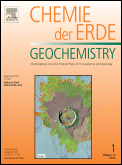
Geochemistry
Bridging Theory and Application in Earth SciencesGeochemistry is a distinguished academic journal published by Elsevier GmbH, focusing on the intricate study of geochemical processes across earth systems. With its ISSN 0009-2819 and E-ISSN 1611-5864, this journal serves as a crucial platform for scholars and researchers eager to disseminate their latest findings in geochemistry, petrology, and geophysics. The journal has established itself within the scientific community, achieving a Q2 ranking in both Geochemistry and Petrology as well as Geophysics, showcasing its significant impact and relevance—ranking 18th out of 165 in Geophysics and 26th out of 154 in Geochemistry and Petrology according to Scopus. From its inception in 1978 to its ongoing contributions through 2024, Geochemistry remains a vital resource for academic discourse and innovation in earth sciences. As an open-access title, it allows for broader dissemination of knowledge, promoting accessibility for researchers, students, and professionals. Whether you are engaged in theoretical research or applied studies, Geochemistry provides the insights necessary to advance our understanding of the planet's chemical complexity.

MINERALOGY AND PETROLOGY
Unveiling the Secrets of Mineral FormationMINERALOGY AND PETROLOGY, published by Springer Wien, is a premier academic journal that has been contributing to the fields of geochemistry, petrology, and geophysics since its inception in 1987. With an ISSN of 0930-0708 and an E-ISSN of 1438-1168, this journal is recognized for its rigorous peer-reviewed articles that advance the understanding of mineral and rock formation processes, their physical and chemical properties, and the implications for broader Earth sciences. Holding a respectable impact factor and categorized in the Q2 quartile for both Geochemistry and Petrology, as well as Geophysics, MINERALOGY AND PETROLOGY ranks favorably among its peers, placing it within the top 50% of scholarly publications in these fields. Researchers, professionals, and students alike will find a wealth of knowledge in its pages, as it serves as a valuable resource for those aiming to explore the complexities of Earth's materials and compositions. Although it does not offer an Open Access option, the journal assures high-quality, impactful research that is crucial for ongoing advancements in Earth sciences.

Journal of Geosciences
Navigating the Frontiers of Earth's ScienceJournal of Geosciences is a distinguished peer-reviewed journal published by CESKA GEOLOGICKA SPOLECNOST, based in the Czech Republic, that serves as a vital platform for the dissemination of innovative research in the field of Earth and Planetary Sciences. With an ISSN of 1802-6222 and E-ISSN of 1803-1943, this journal has established its significance within the academic community, evidenced by its Q3 ranking in both Earth and Planetary Sciences and Geology. The journal covers a broad array of topics, making it an essential resource for researchers, professionals, and students interested in geoscientific advancements and discoveries. The Journal of Geosciences reflects a commitment to high-quality scholarship, embracing a variety of methodologies and interdisciplinary approaches, and provides open access to its content, thereby encouraging global collaboration and knowledge sharing among geoscientists. With a publication history converging from 2007 to 2024, it continues to be a prominent venue for critical conversations and developments in the ever-evolving field of geosciences.